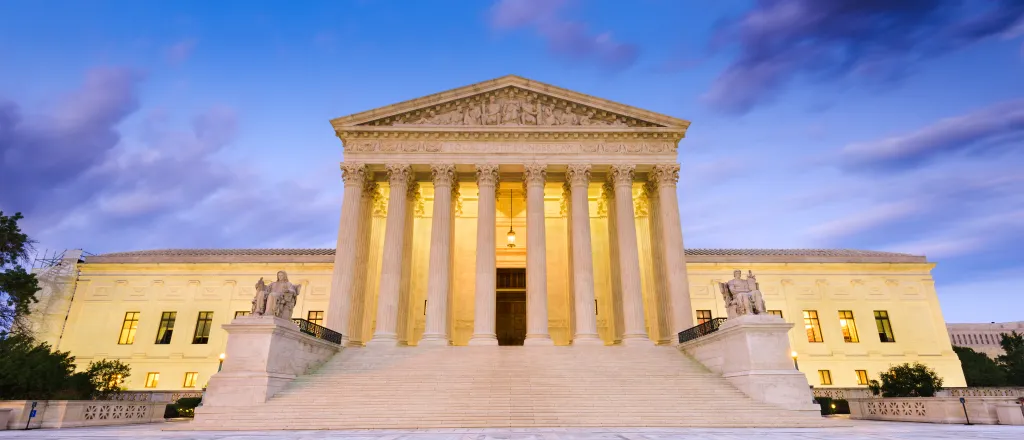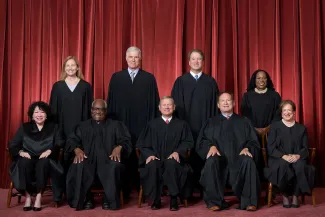
Many medical treatments could be affected by Supreme Court transgender ruling
© iStock - SeanPavonePhoto
The justices’ reasoning in the recent U.S. Supreme Court ruling upholding Tennessee’s ban on youth gender-affirming care could have much broader implications, perhaps opening the door to state restrictions on health care for other groups of people, experts say.
The ruling could give states leeway to make rules on any other sex-related treatment — potentially affecting people of all genders, according to legal and health policy scholars.
In U.S. v. Skrmetti, three families and a physician argued that a Tennessee law barring the use of puberty blockers and hormone treatments for transgender minors violates the U.S. Constitution’s equal protection clause. They asserted that the law discriminates on the basis of sex, since the state allows the use of similar treatments for cisgender boys and girls with other medical conditions.

© iStock - nevarpp
The court weighed the argument of whether the law treats people differently, subject to what is called heightened scrutiny. Under this higher level of judicial review, the state must identify an important objective for a law and demonstrate how it helps accomplish that goal.
But the court’s conservative majority last month ruled that the Tennessee ban doesn’t merit such scrutiny because its restrictions are based on age and the medical uses of certain drugs, not sex. Twenty-six other states have similar laws to Tennessee’s.
The Tennessee law “prohibits healthcare providers from administering puberty blockers and hormones to minors for certain medical uses, regardless of a minor’s sex,” Chief Justice John Roberts wrote. “The law does not prohibit certain medical treatments for minors of one sex while allowing those same treatments for minors of the opposite sex.”
Justice Elena Kagan disputed that view during oral arguments.
“The whole thing is imbued with sex. It’s based on sex,” Kagan said. “You might have reasons for thinking it’s an appropriate regulation and those reasons should be tested and respect given to them, but it’s a dodge to say, ‘This is not based on sex, it’s based on medical purpose,’ when the medical purpose is utterly and entirely about sex.”
Tennessee’s law says the state has a “compelling interest in encouraging minors to appreciate their sex.”
Some legal and policy experts say the court’s reasoning in Skrmetti could allow states to enact further restrictions on abortion, contraception, in vitro fertilization or other health care, particularly sex-specific treatment, sidestepping previous protections.
Jules Gill-Peterson, an associate professor of transgender history at Johns Hopkins University, called the ruling “consequential.”
“The court has basically decreed a new form of legal and political vulnerability that did not exist before the Skrmetti case,” she said. ”Everyone has a sex. Everyone is now much more vulnerable to sex discrimination in this country, even if it hasn’t taken place yet.”
She added that women, especially, could see rollbacks.
“It will greatly advance people’s ability to discriminate against women,” she said. “This case really kind of now altered the legal landscape in a pretty significant way.”
The court has basically decreed a new form of legal and political vulnerability that did not exist before the Skrmetti case.
– Jules Gill-Peterson, Johns Hopkins University associate professor
The ruling marks “a deeply concerning direction,” said Kellan Baker, executive director of the Institute for Health Research and Policy at Whitman-Walker, an LGBTQ+ health nonprofit in the Washington, D.C., area.
“At any time and for any reason, a state legislature could decide that any medical indication is suddenly not politically palatable, and move to ban access to any type of care that legislature wants to target,” Baker said.
He added that the decision is likely to have “serious political ramifications” for more than just transgender people.
Eric Neiman, an attorney at Epstein Becker Green, a law firm focused on health care and employment cases, agreed the ruling “could allow states to regulate all kinds of medical procedures for children and adults.”
Ultimately, Neiman said, the decision indicates “deference to states in decision-making about care that can be provided to children.”
Sex-based protections
The decision builds on the 2022 Dobbs ruling that overturned Roe v. Wade, said Katie Keith, the founding director of the Health Policy and the Law Initiative at the O’Neill Institute at Georgetown University Law Center.

“I don’t know that we would have seen this decision in the same way if we hadn’t had the Dobbs decision three years ago and the erosion of sex-based protections,” she said.
Keith pointed to state actions that followed Dobbs, such as a decision by Iowa’s attorney general to halt funding for emergency contraceptives for sexual assault victims. The policy drew significant outcry, which resulted in the office resuming funding.
Leah Litman, a University of Michigan law professor, wrote in a recent essay in The Atlantic that Roberts and the other conservative justices revived “an outdated case” when they cited the 1974 decision in Geduldig v. Aiello, in which the justices ruled it was permissible to deny certain benefits for pregnancy-related disabilities.
“If the Republican appointees plan to revive this older case, they will take the law and the country back to a time when the government used the existence of ‘biological differences’ between men and women to excuse all kinds of discrimination against women,” Litman wrote.
Also at stake are previous appellate court decisions out of West Virginia and North Carolina that protected transgender adults’ access to public insurance coverage for transgender care. The Supreme Court threw outthose rulings and ordered appellate judges to reevaluate in light of the Skrmetti decision. Another case involving gender-affirming medical care out of Idaho will also have to be reevaluated.
‘Scientific and policy debates’
Critics of gender-affirming health care for youth hailed the Skrmetti ruling, citing recent research that calls into the question the efficacy of such treatments. The decision was “a monumental victory, for children, science, and common sense,” Kristen Waggoner, president and CEO of Alliance Defending Freedom, wrote in an emailed statement.
But dozens of leading U.S. medical organizations, including the American Academy of Pediatrics and the American Academy of Child and Adolescent Psychiatry, have stressed that gender-affirming care for minors is safe and essential.
“Denying patients access to this care not only undermines their health and safety, it robs them of basic human dignity,” Dr. Susan J. Kressly, president of the American Academy of Pediatrics, said in a statement following the decision. “The ruling also sets a dangerous precedent for legislative interference in the practice of medicine and the patient-physician relationship that is at the core of our health system.”

Memebers of the Supreme Court of the United States 2022 - WIkimedia - Public Domain
But in his opinion, Roberts insisted that the case carries “scientific and policy debates.” “The Equal Protection Clause does not resolve these disagreements. Nor does it afford us license to decide them as we see best,” he wrote.
Justices Ketanji Brown Jackson and Sonia Sotomayor said the majority’s arguments mirror those made in defense of banning interracial marriage in the Loving v. Virginia case. The Supreme Court struck down the ban in 1967.
“In a passage that sounds hauntingly familiar to readers of Tennessee’s brief, Virginia argued in Loving that, should this Court intervene, it would find itself in a ‘bog of conflicting scientific opinion upon the effects of interracial marriage,’” Sotomayor wrote in her dissent.
Advocates say the narrowness of the Skrmetti decision could make it possible to challenge state bans on health care for trans youth on other grounds.
“[The ruling] is not a blanket endorsement of the various state bans on medical care for transgender youth. It is a tortured and narrow upholding of Tennessee’s,” said Baker, of Whitman-Walker. “The court sidestepped the actual question about equal protection.”
For example, a plaintiff could argue that parents have a constitutional right to make medical decisions for their children. Supporters of transgender rights also noted the decision did not take aim at equal protection rights for transgender adults, but other obstacles remain amid an onslaught from the Trump administration.
President Donald Trump has issued an executive order recognizing only biological sex and not gender identity. The administration has also frozen federal grant money dedicated to LGBTQ+ health and issued warnings for gender-affirming care for minors.
And the administration last month finalized a rule barring health plans offered on Affordable Care Act exchanges from covering gender-affirming care — defined as surgeries, puberty blockers and hormone treatment — as an essential health benefit. The decision means that payments for such care cannot be applied toward deductibles.
“[The court] signaled that perhaps some of the kinds of protections, or maybe just backstops, people had been hoping existed, they’re just not there,” Gill-Peterson said.
















